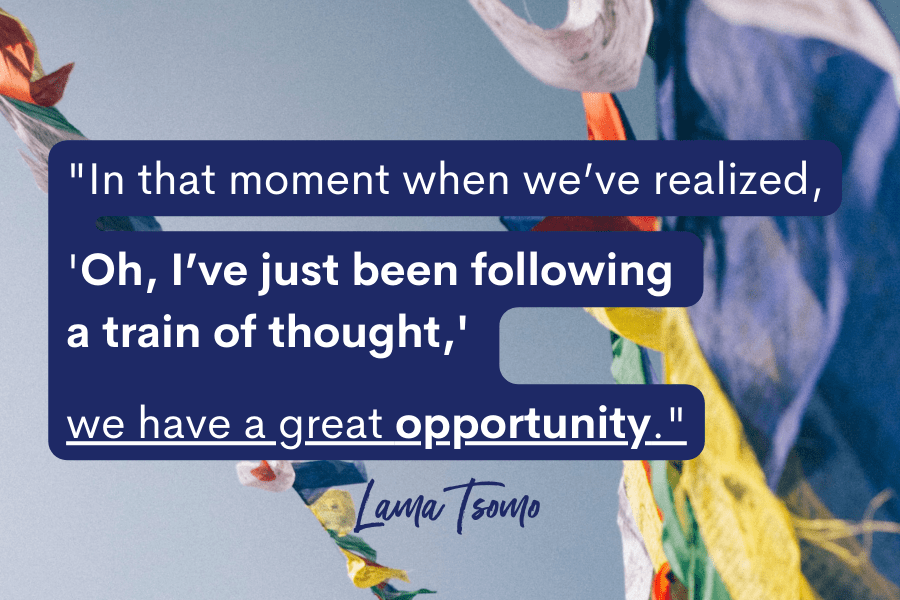Tip: Take it easy on yourself! Being hard on yourself and harshly judging your meditation practice will not improve your meditation sessions. Enjoy the following Wisdom & Compassion (Starting with Yourself) excerpt about working with our minds rather than against them by Lama Tsomo.
Unrealistic Expectations (or, I Want Patience, and I Want It Now!)
As I’ve said, we can’t have ridiculous, unrealistic expectations. If a teacher yells at a child when they do something they’ve always done before, the teacher is not going to have a very good student. It will actually take much longer to train that child, if at all, and both teacher and student will be absolutely miserable in the process.
Because the unconscious mind is much bigger and stronger than the conscious mind, I don’t see how you can ever beat it into submission by saying, “Oh, I’m a lousy meditator. Look, I screwed up AGAIN!” Anyone who’s ever tried to diet knows you can’t bully the subconscious. It will win in the end. I’ve given up dieting and started really listening to what (and how much) my body actually wants. I’ve weighed about twenty pounds less for decades since.
Maybe our problem is that we think we should already be able to do this Shamata thing.
It reminds me of my son: a week before his first piano lesson he urgently asked me to teach him some piano. I said, “But you’re just about to start taking lessons.” After increasingly insistent requests and my same answer, he finally replied, “But that’s WHY I need you to teach me—quick, before I have to play at that first lesson!” He thought he already had to know how to play piano. I assured him that the teacher was expecting him to know nothing and was fully prepared to start teaching him from the beginning. So allow yourself to be a rank beginner! Even if you’ve tried this before, you might as well allow yourself to have the wandering mind of a sentient being. (I’ll bet you still are one.) These practices are designed to start where we are and go from there.
As Westerners, and this is perhaps particularly true for Americans, we focus on the individual: self-sufficiency, self-reliance, individual rights, rugged individualism. These are all powerful and often positive and constructive concepts.

But if we focus only on our individual selves, we are also cultivating isolation, detachment, and a profoundly limited sense of the fundamental unity of all reality. A good medicine for this self-limiting loneliness would be to cultivate a new habit of being every time you sit down to meditate. You drop the drama that you’re the star of (and—dare I mention it?—the author). You take a break from chasing after what you “need” and running from what is “bad” for you. You expand your definition of “I” (ego) to include all and everything, at least for a little while.
When We Realize We’ve Been Following a Thought
Meditation Tips and Strategies for Improving Your Meditation Practice
As noted, many modern people mentally beat themselves up just for having a train of thought and become so frustrated, and discouraged, that they can’t sustain a full session of Tranquil Abiding.
In fact, Rinpoche recommended that I do meditation in mini sessions, meaning from moment to moment. No, not getting up and fixing breakfast! When we notice that we’ve been following a train of thought, at that moment—in that mini session—we’re more aware than we’ve been for most of our life! Maybe many lives. That moment of noticing the movie is something to celebrate! If we praise the puppy whenever it does what we want, it will tend to do it more and more. Great! (One of the most useful insights of behavioral psychology, particularly the strand pioneered by B. F. Skinner, is that it is productive to reward the behavior we’re looking for, but it is not productive to punish unwanted behavior, which should, instead, just be ignored.)
The moment we recognize we’ve been following a thought and we let it go—the moment of remembering (until we forget, and start making another movie)—marks the end of this mini session I’m speaking of. Then we settle back into that calm, bright, whole-ocean state. This marks the beginning of the next mini session.
We can do many of these mini sessions in one sitting (and, over time, they will get less “mini” as we do this practice). As a matter of fact, if we’ve done a lot of these, we’ve had a lot of moments of mindfulness, which is a great thing! So the arising of thoughts is actually an opportunity—grist for the mill of awakening.

The Tibetan word for meditate, gom, means a few different things. Depending on the spelling it can mean “meditate,” “visualize,” or “completely familiarize.” The connotation of the last meaning is that we step onto this place with the familiarity of having experienced it again and again so that we have utter confidence. What a concept!
People sometimes think that if they have a moment of revelation or clarity, they’ve arrived. But have they really? Have they done more than take a peek? If they’re still bumbling around, sowing seeds of disaster just as before, despite that revelatory experience, I’d say they might want to spend some time there—not just pass through on a single visit or two, and then talk about it, but take up residence there. It’s the difference between taking a two-hour tour of Paris and moving there to live; you’re not a Parisian just because you saw the Eiffel Tower from a tour bus. Enlightenment is a long, transformational process. The glimpses are crucial, but they’re not the end, or the whole.
Learn more about Wisdom & Compassion (Starting with Yourself) HERE.
Excerpt, pages 46-49, from Ancient Wisdom for Our Times. Tibetan Buddhist Practice: Wisdom & Compassion (Starting with Yourself) (c)2021 Lama Tsomo LLC. Published by Namchak Publishing Company LLC, USA.
